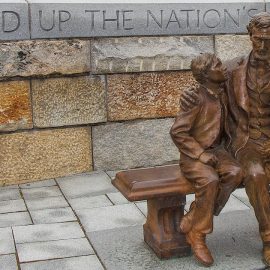

This article is an excerpt from the Shortform summary of "The Smartest Guys in the Room" by Bethany McLean and Peter Elkind. Shortform has the world's best summaries of books you should be reading.
Like this article? Sign up for a free trial here .
Who were the Enron executives who contributed to the company’s collapse?
There were several Enron executives that contributed to the issues at Enron. From fostering ineffective business culture to outright fraud, these Enron executives exacerbated Enron’s problems and created new ones, leading to the company’s collapse in 2001.
Enron Executives
There were several Enron executives that helped drive the culture of fraud. These leaders engaged in bad business practices and prioritized deceit.
1. Ken Lay
Ken Lay, founder and CEO of Enron, believed in efficient markets. The 1970s energy crisis caused natural gas to become deregulated. Lay saw an opportunity to profit from this deregulation.
Lay had served in various roles in gas companies before heading Houston Natural Gas (HNG) in 1984. His vision was to control a large fraction of pipeline which would allow better negotiating leverage.
Larger Omaha company InterNorth, in danger of being taken over by corporate raiders, wanted to defensively increase its size and debt load. It acquired HNG in 1985, with terms very favorable for HNG. Ultimately, Lay gained control of the board and became CEO of the company, renaming it Enron.
Ken Lay’s Personality
Like other Enron execs, Ken Lay’s personality contributed to his problems with the company.
- Loved his public persona as a business sage, leading an old industry into a new era
- Became engrossed by his charity foundation, networking with Washington elite, and being a local gatekeeper in Houston politics. Aimed to be treasury secretary.
- Known internally in Enron as a pushover when negotiating pay and bonuses.
- Was a weak manager, wanting others to like him and hiding behind the board for tough decisions (like not promoting Rich Kinder). Lied to keep people from getting mad at him
- Wall Street analysts viewed him as useless and out of touch with how the business worked – they preferred Kinder who delivered the numbers.
- Used Enron’s resources for his family (family use of company jets) and engaged in nepotism (used a relative’s travel agency to book Enron flights).
- Became a missionary for deregulation
- This had worked once before in natural gas.
- He inappropriately applied this mission to retail utilities, without proof that the states were actually moving in this direction. Enron bet big and lost.
2. Jeff Skilling
Jeff Skilling is one of the Enron executives who eventually was convicted for his role in misleading investors.
With the power vacuum, Skilling (head of Enron’s trading operations) maneuvered into the COO role, basically by threatening to quit if he didn’t get it. This triggered a number of changes:
1) The focus shifted to trading as the core of Enron’s business. Physical assets that actually dealt with supplying energy were sold off.
- EOG (Enron Oil and Gas) was spun off. It still survives today as a public company, EOG Resources.
2) Enron’s trading scope expanded outside natural gas. Their aim was to become “The World’s Leading Energy Company.” They expanded into electricity, and they engaged in plant deals from gas plants to water, steel, and paper. The promise was huge – if Enron could create an electricity-trading business and claim 20% of it, the payoff would be enormous.
- But they overextended, believing the markets were more similar to gas than they really were. For example, as an outsider to electricity, Enron was feared as the big player that incumbents shouldn’t partner with.
3) Enron International head Rebecca Mark was sidelined and knew she wouldn’t rise further in management. She decided to buy a British water utility, forming the company Azurix. (This would later end in failure, described in a later chapter.)
4) Skilling set up a Risk Assessment and Control (RAC) department, which publicly was believed to be watertight and having strong veto power over risky deals. Stock analysts believed Enron had tight risk management capabilities, which gave Enron the leeway to take on more risk than other companies.
- In reality, RAC was just a yesman, with a weak manager in place who didn’t fight against bad deals.
- RAC staff also faced strong pressure to close deals to hit quarterly numbers. Enron’s staff had a peer review system that was a key component of promotions and compensation. Deal originators within Enron threatened poor peer reviews for RAC peers who didn’t approve deals.
- An intellectual purist, a designer of ditches, not a digger of ditches. Often slow to recognize when reality didn’t match theory. Left the execution details to his lieutenants.
- “I’m not particularly interested in the balance sheet. It seemed to be doing well. We always had money.”
- In the retail Enron Energy Services business, Skilling disparaged the operators of utilities as “buttcrack “ workers. “This stuff sells. Now we have to actually do something for the customers. That’s the easy part.”
Jeff Skilling’s Personality
Enron leaders were often known for their intense personalities, like Jeff Skilling.
- A gambler at heart, always assumed he could beat the odds. (He was wiped out in the stock market twice in his teens.)
- Convinced he was the smartest guy in the room – anyone who disagreed wasn’t smart enough to get it
- He bullied analysts who questioned how Enron made money. If he didn’t want to answer a question, he dumped a lot of data. If you still didn’t get it, he’d call you stupid.
- Darwinian in management. Encouraged confrontation between subordinates.
- When developing a business, price was no object – the business Enron could build with an asset would far outweigh a higher price in the beginning.
- Rarely pushed back on deals he believed were bad, promising to hold people accountable but rarely doing so.
- Obsessed with Enron’s stock price on a daily basis.
3. Andy Fastow
In 1998, the rise of Andy Fastow to CFO brought complicated structured-finance deals that gave Enron cash that could be kept off the books. The goal of these deals was to keep fresh debt off the books, camouflage existing debt, or book earnings or cash flow. They allowed Enron to borrow money while disguising their real debt.
In summary, Enron took out large loans and made them appear like cashflow. Enron had to pay these loans back over time, but it didn’t actually have real cashflow. So it would take out further loans to pay back earlier loans. This is the corporate equivalent of starting new credit cards to pay back old credit card debt. Andy Fastow is one of the Enron executives that helped drive the unethical accounting practices.
Andy Fastow’s Personality
Andy Fastow’s competitive personality is part of what drove bad business practices.
- Burned with ambition, “not necessarily to be the best but to be seen as the best”
- Exaggerated his resume to claim greater credit for securitization work
- Had a chip on his shoulder by being in finance and not a department with P&L. Wanted to establish finance as a profit driver and thus sharing in the bonuses
- A gratuitous self-promoter and brown-noser
- Had a short temper, causing people to be afraid of speaking out
4. Rebecca Mark
Rebecca Mark headed Enron International, and was one of the Enron leaders “drank the koolaid” Fueled by a compensation scheme that rewarded closing deals and not actually building the businesses, Rebecca Mark globetrotted and closed deals in dozens of countries. She positioned Enron as the “solver of the unsolvable problem.” She was hungry to come up with projects bigger and better than Teesside.
The projects were often troubled. The largest scandal was in Dabhol, India. A province struck a deal very favorable to Enron, guaranteeing a long-term purchase of highly priced energy. The Indian population revolted, seeing it as rapacious globalization. This stymied development for years.
Furthermore, the financing for projects was often unclear. Enron International hoped the funding they would come from non-Enron sources, but sometimes Enron ended up guaranteeing the debt.
Enron International fed Ken Lay’s desire to hobnob with international luminaries like Kissinger and heads of state, making it less likely to be scrutinized.
By 1996, Enron International accounted for 15% of Enron’s earnings.
5. Rich Kinder
In 1996, Enron COO Rich Kinder was expecting the CEO job. Around this time, Ken Lay was expected to go into politics, but he knew he wouldn’t get a political appointment under Democratic Clinton. Lay also didn’t respect the work that Kinder did. So Lay ousted Kinder, who founded energy company Kinder Morgan afterward (still a healthy company today worth around $45 billion as of time of this writing).
Kinder was a voice of reason within Enron, expecting discipline and skeptical of bad deals. After the collapse of Enron, some suspected Enron could have saved itself and Enron leaders would have been better off had he been appointed CEO.
Two Enron executives, Ken Lay and Jeff Skilling, were convicted for their role in the Enron scandal. They, alongside other Enron Executives, were responsible for misleading investors and bad business practices.

———End of Preview———
Like what you just read? Read the rest of the world's best summary of Bethany McLean and Peter Elkind's "The Smartest Guys in the Room" at Shortform .
Here's what you'll find in our full The Smartest Guys in the Room summary :
- How Enron rose to become one of the world's most promising companies
- How Enron management's greed led it to start cutting corners
- The critical failures that crashed Enron's house of cards to the ground






